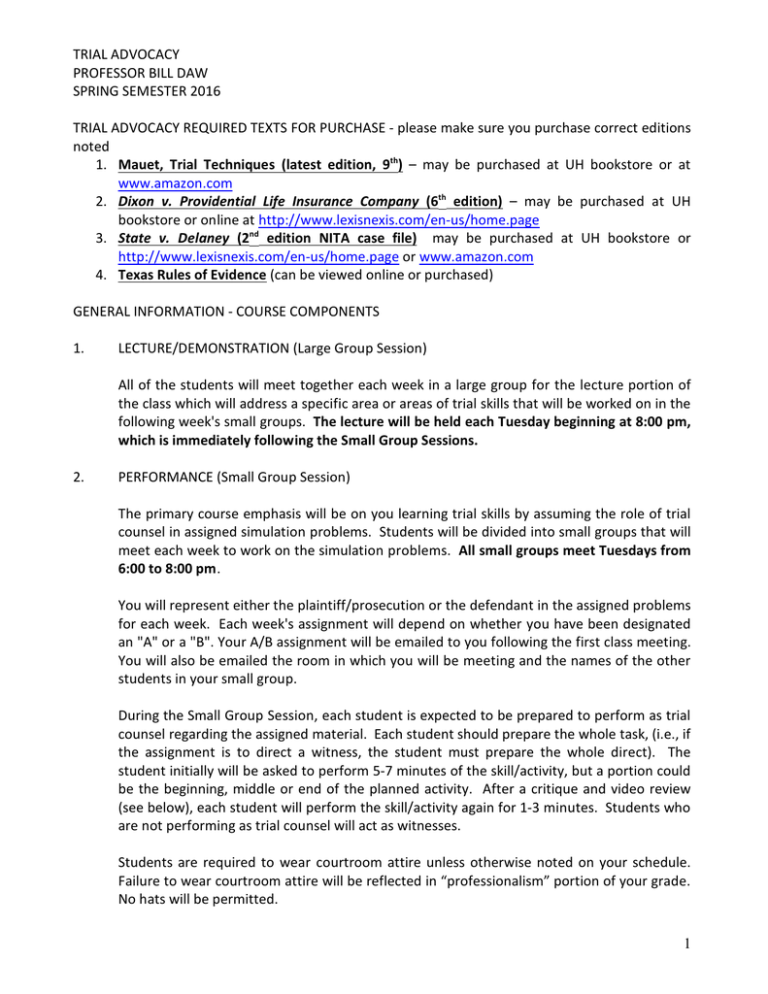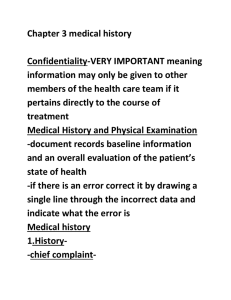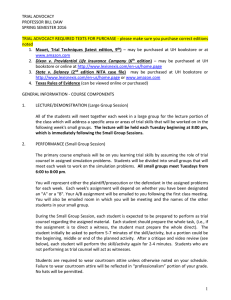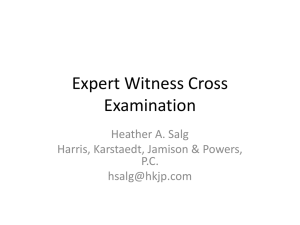TRIAL ADVOCACY PROFESSOR BILL DAW SPRING SEMESTER 2016
advertisement

TRIAL ADVOCACY PROFESSOR BILL DAW SPRING SEMESTER 2016 TRIAL ADVOCACY REQUIRED TEXTS FOR PURCHASE - please make sure you purchase correct editions noted 1. Mauet, Trial Techniques (latest edition, 9th) – may be purchased at UH bookstore or at www.amazon.com 2. Dixon v. Providential Life Insurance Company (6th edition) – may be purchased at UH bookstore or online at http://www.lexisnexis.com/en-us/home.page 3. State v. Delaney (2nd edition NITA case file) may be purchased at UH bookstore or http://www.lexisnexis.com/en-us/home.page or www.amazon.com 4. Texas Rules of Evidence (can be viewed online or purchased) GENERAL INFORMATION - COURSE COMPONENTS 1. LECTURE/DEMONSTRATION (Large Group Session) All of the students will meet together each week in a large group for the lecture portion of the class which will address a specific area or areas of trial skills that will be worked on in the following week's small groups. The lecture will be held each Tuesday beginning at 8:00 pm, which is immediately following the Small Group Sessions. 2. PERFORMANCE (Small Group Session) The primary course emphasis will be on you learning trial skills by assuming the role of trial counsel in assigned simulation problems. Students will be divided into small groups that will meet each week to work on the simulation problems. All small groups meet Tuesdays from 6:00 to 8:00 pm. You will represent either the plaintiff/prosecution or the defendant in the assigned problems for each week. Each week's assignment will depend on whether you have been designated an "A" or a "B". Your A/B assignment will be emailed to you following the first class meeting. You will also be emailed the room in which you will be meeting and the names of the other students in your small group. During the Small Group Session, each student is expected to be prepared to perform as trial counsel regarding the assigned material. Each student should prepare the whole task, (i.e., if the assignment is to direct a witness, the student must prepare the whole direct). The student initially will be asked to perform 5-7 minutes of the skill/activity, but a portion could be the beginning, middle or end of the planned activity. After a critique and video review (see below), each student will perform the skill/activity again for 1-3 minutes. Students who are not performing as trial counsel will act as witnesses. Students are required to wear courtroom attire unless otherwise noted on your schedule. Failure to wear courtroom attire will be reflected in “professionalism” portion of your grade. No hats will be permitted. 1 3. VIDEO REVIEW Most class performance as trial counsel will be recorded. You will be required to review your recorded performance with one of the adjuncts during the class session each week videotaping occurs (see assignment section for further information). You should also view the recorded performance on your own to assess areas on which you need to work. 4. TRIALS There will be two trials during the semester. The 1st is a non-graded Bench Trial and the 2nd is a Full Jury Trial that will serve as a final exam. The Bench Trials will be held on Saturday, February 20, 2016 at UHLC (unless otherwise noted by your small group adjunct(s).) Final Jury Trials will be held Saturday, April 23, 2016, at the Harris County Civil Courthouse from 8:30am- 12:45pm. Please mark your calendars now! Note: if you are not available on those dates: please notify Professor Daw wbdaw@dawray.com & Nicole Dellario nhdellar@central.uh.edu at the beginning of the semester. In your email, please let us know generally the reason you are not available. 5. TRIAL OBSERVATION You are required to observe a jury trial during the course of a semester. You are not required to see an entire trial. You must observe a minimum of 6 hours that includes two out of the following: voir dire, opening statements, direct and cross of two witnesses, jury charge conference, or closing arguments. While you need not see all parts in one trial, you must see compete parts; (i.e., you must see both the prosecutor’s and defense counsel's opening statement, or both the plaintiff and defense counsel's closing arguments). You must submit a paper, not exceeding five pages. The paper should include the date and time of your observation(s), the court, the judge, the style of the case, a brief explanation of the case and a critical description of what you observed including your comments on what you thought the lawyers did that was effective and ineffective. The paper is to be submitted via email to the Professor Daw wbdaw@dawray.com and cc to Nicole Dellario in the Blakely office nhdellar@central.uh.edu. The paper must be turned in by 5p.m., Monday, April 11, 2016. Trials may be announced periodically during the semester; however that information is for your convenience. All students are required to independently identify trials to observe. The observation must be during the semester. It is not acceptable for the observed trial to have occurred prior to you beginning the class. 6. ADDITIONAL CLASS ATTENDANCE REQUIREMENT You will be required to attend 2 class sessions outside of the regularly scheduled Tuesday night class sessions. The 2 class sessions will address Trial Technology & Demonstrative Aids and will be conducted by 1 of your adjuncts TBD. The 1st of these sessions is Thursday, February 4, 2016 (location TBD at UHLC). The 2nd session is Thursday, February 18, 2016 (location TBD at UHLC). Please mark your calendar accordingly. If you have an irreconcilable scheduling 2 conflict, these classes will be videoed for later viewing. You must confirm that you have viewed the sessions in order not to have a significant reduction in your professionalism grade. 7. ATTENDANCE AND GRADING Attendance at the Lecture/Demonstration and Small Group sessions is mandatory. There is no general attendance taken, except during the 2 class sessions covering Trial Technology & Demonstrative Aids and any class for which you will not be graded. Each week, your performance in the Small Groups is judged and graded. The failure of a grade will count as an absence. An unexcused absence will be marked as a “0” for that week, which will reduce the overall grade for the Small Group performances. It will be considered an Honor Code violation for a student to attend the Small Group session and fail to attend the following lecture without notifying Professor Daw. As your presence is necessary for the demonstrations, any absence will need to be planned for. If you are not going to attend class, you must advise Nicole Dellario & Professor Daw via email as soon as possible, and generally provide the reasons. Many of you are on Advocacy teams, which is obviously encouraged. It is considered an excused absence if you are participating in a competition. It is not an excused absence for you to miss class to attend any form of practice session. If it is determined that a student failed to attend the lectures after attending the small group, without notifying Professor Daw, the student will be docked the full 10% on your professionalism grade (see below). Each session is graded and your “final” Small Group Grade is the total of your daily scores divided by the number of classes attended. Any unexcused absence will be counted as an attended class, i.e., if you attend 9 sessions and fail to notify Nicole or Professor Daw of your absence, the total of the daily score will be divided by 10. Also, you will be docked one professionalism point for each class missed when no notification occurred. The final grade for the course will be based on your performance in the Small Group sessions, your performance on other assigned work, such as the observation paper, and your performance in the final jury trial. There is also a professionalism category which addresses such things as your attire, your preparedness, your compliance with class requirements, the manner in which you address judges when playing the role of an attorney in a simulated event, and your general overall professionalism. There will be no written final examination. The performances in the Small Group sessions will count for 55% of your final grade. Your performance in your final trial will count for 30% of your final grade. The court observation paper will count for 5% of your final grade. The final 10% of your final grade will be based upon your professionalism as observed by all adjuncts. 8. ADDITIONAL READING There are a number of excellent references and texts you may refer to as a supplement to the assigned text. The following titles are on reserve in the library. ABA, Litigation Manual, Trial Bergman, Trial Advocacy in a Nutshell Jeans, Trial Advocacy Hegland, Trial and Practice Skills in a Nutshell McElhaney, Trial Notebook 3 9. GENERAL RULES FOR THE SMALL GROUPS A. You must be prepared each week to perform the required assignment and to act as a witness for the required assignment. You will be graded on your performance AND on whether you demonstrated a full understanding of the role of the witness you were portraying in the exercise. Not being fully prepared as a witness will be noted by the observing adjuncts and will reduce both your daily grade for your performance that evening, and your professionalism grade. Also, inappropriate or obstructive behavior as a witness will reduce your professionalism grade. B. We will follow the Texas Rules of Evidence. Review the Rules as necessary before class and bring a copy of the Rules to class. C. The rules vary from jurisdiction to jurisdiction and from judge to judge on the proper way to question witnesses. In Harris County, most judges require examination of witnesses while seated at the counsel’s table. In Federal Court in Houston, most judges require questioning from a podium. Some judges allow the attorney to walk around the courtroom while questioning. We will use all 3. Please check the daily assignment to determine whether questioning of the witness should be while seated, at a podium, or while walking around the courtroom. D. Follow the ALL OBJECT RULE. Everyone, except the witness, should object whenever there are legal grounds for doing so. Do not hold back for tactical reasons unless otherwise instructed. Failure to object during the Small Group session can be a factor in your Small Group grade. E. When objecting or otherwise addressing the judge, stand up immediately and remain standing until the judge rules on the objection. If the witness has given an adverse answer before you had time to object, remember to ask the court to strike the answer and to instruct the jury to disregard the answer. Not standing when addressing the judge will be noted by the grading adjuncts and will reduce your professionalism grade. F. All objections should be addressed to the judge and should include a very brief statement of the reason for the objection. Do not argue unless you are invited to do so by the judge. If argument is requested, approach the bench (constructively unless instructed otherwise) to present your argument. Counsel should present their argument and responses to the judge and should not engage in discussion with each other. G. You should be prepared to conduct the examinations and other assigned exercises in their entirety, although usually you will be able to conduct only a portion. You usually will be expected to examine a witness or perform for 5-7 minutes. You will then be given a 2-3 minute critique where you will be able to ask questions. You will then go to video review. When you return, you will do an additional 1-3 minute performance. H. Because of the nature of the class, it is necessary to use “volunteers” on 3 occasions 4 to fulfill the roles of jurors and witnesses. You will be expected to provide 2 “jurors” to make up a voir dire panel during the Small Group session for March 22nd and March 29th. Please make arrangements well in advance of these dates so there will be no issues as the success of these 2 classes depends on the participation of “jurors”. Failure to procure “jurors” for these days will reduce your professionalism grade. You will also be expected to provide 2 witnesses for the final trial. As the final trial should be a “team event”, you will likely be responsible for only 1 witness. ASSIGNMENTS Case Files: Nita Liquor v. Dan Jones, State v. Delaney and Dixon v. Providential Life Insurance Company The Building Blocks, non-case file problems and all other documents referred to below may be found on the UH Trial Advocacy student webpage: http://www.law.uh.edu/blakely/trialadvocacy/homepage.asp Note: For Weeks 1 through 3 the class will work on the Nita Liquor Commission case. This problem may be found online. A's will represent the prosecution; B's will represent the defense. WEEK l DIRECT EXAMINATION (Building Block #1) January 19 Required reading: Mauet, pp. 1-11, 109-177, 569-579 Problems: No Small Group session this week. Instead, students will remain in the Lecture/Demonstration group from 6:00pm until 9:00pm to watch a trial demonstration. [Casual Dress; No Videotaping] WEEK 2 CROSS EXAMINATION (Building Block #2) January 26 Required reading: Mauet, pp. 190-192, 197-270, 579-581 Problems: 1 (see website) A's prepare and conduct a direct examination of Investigator Bier; B's prepare and conduct a direct examination of Dan Jones. Questioning is to be from counsel table. WEEK 3 FOUNDATIONS (Building Block #3) February 2 Required reading: Mauet, pp. 271-375, 606-609 Problems: 1 (see website) A's prepare and conduct a cross examination of Dan Jones; B's prepare and conduct a cross examination of Inspector Bier. 5 WEEK 4 OBJECTIONS (Building Block #4) February 9 Note: For Weeks 4 through 7 the class will work on the State v. Delaney case file. This will also be the case file for the bench trials. B's will represent the prosecution; A's will represent the defendants. Required reading: Mauet, pp. 505-552 Problems: A's prepare and conduct a direct examination of Marty Pafko and a cross examination of Detective Alex Lowrey; B's prepare and conduct a direct examination of Detective Alex Lowrey and a cross examination of Marty Pafko. You must use an exhibit as part of your direct examination. Questioning should be from the podium WEEK 5 IMPEACHMENT (Building Block #5) February 16 Required reading: Mauet, pp. 168-173, 221-270 Problems: A's prepare and conduct a direct examination of Ardell Delaney and a cross examination of Val Cavaretta; B's conduct a direct examination of Val Cavaretta and a cross examination of Ardell Delaney. You must use an exhibit as part of your direct examination. ______________________________________________________________________ BENCH TRIALS: SATURDAY, FEBRUARY 20, 2016 (at UHLC – times/rooms TBD) ______________________________________________________________________ WEEK 6 EXPERTS (Building Block #6) February 23 Required reading: For Bench Trials, Mauet, pp. 377-442 Mauet, pp. 595-613 Problems: 2, 3 (see website) A's conduct a cross examination and impeachment in Problem 2 and a redirect examination in Problem 3; B's conduct a redirect examination in Problem 2 and a cross examination and impeachment in Problem 3. (These problems are on the course website, not in the case file) [Court Attire, No Videotaping] For the remainder of the semester, the class will work on Dixon v. Providential Life Insurance Company. This will also be the case file for the final trials. A's will represent the plaintiff; B's will represent the defendant. (However, for the week 7 problem, we are using a problem from a different case file, which can be found on the course website). WEEK 7 Required reading: CASE THEORY (Building Block #7) March 1 Mauet, pp. 13-27, 560-568, 579-594 6 Problems: WEEK 8 A's prepare and conduct a direct examination of Robert Glenn; B's prepare and conduct a cross examination of Robert Glenn. (This problem is on the course website, not in the case file.) JURY SELECTION (Building Blocks #8 and #9) March 8 Required reading: Mauet, pp. 29-70, 567-568 Problems: Case Analysis for the side you will be representing in your final trial. You will be conducting an analysis of the case for the side you will be representing in your final trial, concentrating on the development of: (1) Legal Theory of the case (why the law allows your client to win); (2) Factual Theory of the case (what happened and why); and (3) Persuasive Theory of the case (why your client should win as a matter of fairness and justice). Prosecution and Defense Counsel will meet separately. [Casual Dress, No Videotaping] WEEK 9 Problems: JURY SELECTION (Building Blocks #8 and #9) March 22 Prepare and conduct voir dire examination. Limit your questioning to a maximum of 2 issues concerning the demographics of the panel members. YOU ARE STRONGLY ENCOURAGED TO BRING 2 "OUTSIDERS" TO YOUR SMALL GROUP SESSION TO SERVE AS PANEL MEMBERS WEEK 10 OPENING STATEMENT (Building Block #10) March 29 Required reading: Mauet, pp. 73-108, 565-567 Problems: Continue conducting voir dire for the side you were assigned concerning 2 of the issues in the case. YOU ARE STRONGLY ENCOURAGED TO BRING 2 "OUTSIDERS" TO YOUR SMALL GROUP SESSION TO SERVE AS PANEL MEMBERS WEEK 11 CLOSING ARGUMENTS (Building Block #11) April 5 Required reading: Mauet, pp. 443-503, 590-591 Problems: Present a portion of your opening statement, no more than 8 minutes in length, for the side you will be representing in your final trial. WEEK 12 PRETRIAL PROCEDURE (Building Block #12) April 12 7 Required reading: Mauet, pp. 236-237, 553-560, 593-594 Problems: Present a portion of your closing arguments, no more than 10 minutes in length, for the side you are representing in the final trial. FINAL TRIALS SATURDAY, APRIL 23, 2016 (Harris County Civil Courthouse) If you need to meet with Professor Daw – please contact via email wbdaw@dawray.com or you may text at 713-824-0151 to set up an appointment. Regardless of the method used, please identify yourself as a student in the Trial Ad class in the “subject line” of the email or in the 1st line of the text. All adjuncts for the semester will also be listed on the student webpage, which you will receive access to after the class begins. 8






